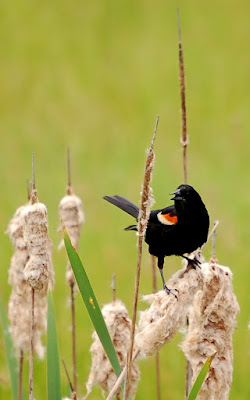There is large, grassy field edged with cattails that I pass every day on my way to work. In early spring, I eagerly await seeing the male Red-winged Blackbirds that perch on the cattails, small trees, and even the stop signs along that stretch of road. Early in the season many of them congregate rather close to each other, sometimes even sharing the same tree. But once breeding season is under way, only one male (MAYBE two) will claim that field as his territory.



Displaying and singing
I have read that the male Red-winged Blackbirds, just like male Bobolinks, are polygynous (one male mates with many females). Here are a few members of this male's harem, barely visible through the tall grasses:




Click any photo to enlarge
There was a lot of chatter going on among these birds the day I took these photos. Not only was the male singing, but the females were extremely vocal as well. As I watched their movements out in the field, I began to wonder if they had active nests that they were guarding. My question was soon answered when I saw both the females and the male bringing in food for new baby blackbirds...



I was not able to determine where their nests were actually located, as both the male and female birds were very wary of my presence and were determined not to give away their nest location(s).
Here are some interesting facts about the Red-Winged Blackbird:
- The male spends at least a quarter of his time during daylight hours defending his territory against other males and nest predators.
- The oldest recorded Red-winged Blackbird was 15 years 9 months old.
- Red-winged Blackbirds throughout most of the U.S. migrate only very short distances, if at all.


13 comments:
Great photos. Re the timing of your photos - don't forget that down on this side of the world the breeding and nesting season is quite different so your posts were right on time - some of our birds have young already! Of course I am in the sub-tropical part of the country so that is different again from further south.
Great post Heather and nice photos of the Red-winged Blackbirds! I find it very difficult to actually see a RWBB nest as they are usually deeply hidden in the reeds or tall grasses.
Great photo's of the black birds!! lovely and I'm glad you took the time to show us these great shots Heather.
What great shots you got Heather! I haven't seen any this summer.
Very interesting photos and information, Heather!
I always feel a little sad when the avian breeding season winds down. Thanks for these reminders of that exciting time. And I had no idea a RW blackbird could live that long - cool!
...an oldie but a goodie! I love when these birds first start arriving in late Feb and early March...then watching as they grab their territories. Beautiful photos of them in the field.
Great photo series Heather! When the RWBB first show up in the spring, they are so noisy but fun to watch. They are starting to migrate here in Maine. We had over 400 land in the marsh off our back yard Saturday and then take off in a cloud that was jaw dropping! Others in Maine are reporting large congregations of RWBB and Grackles slowly moving in a southerly direction.
Great action shots of the red-winged blackbird! They certainly are the "Romeos" of the bird world!
:-)
Nice photos! I love me a blackbird on a cattail! Getting caught up on your blog...I am 5 posts behind. Eek! By the way you might have an interest in a blog I came across and joined called the World in Black and White. There is a photo link on my blog...you ought to check it out.
Great observations and very beautiful photos.
Thank you all for your nice comments and for stopping by for this Bird Photography Weekly entry. Glad you enjoyed it. One thing that I should have mentioned in the post is that the trade-off for not having the dawn chorus is the lovely nighttime chorus that is in full swing now: katydids, crickets, and a myriad of other singing night creatures that I don't yet know the names of.
Great photos Heather!
I'm always delighted to hear their song in early spring. There are always a few who spend the whole season at my birdfeeders too. I know some people don't like them, but RW Blackbirds are "summer" to me and I really miss them when they depart in the fall.
Post a Comment